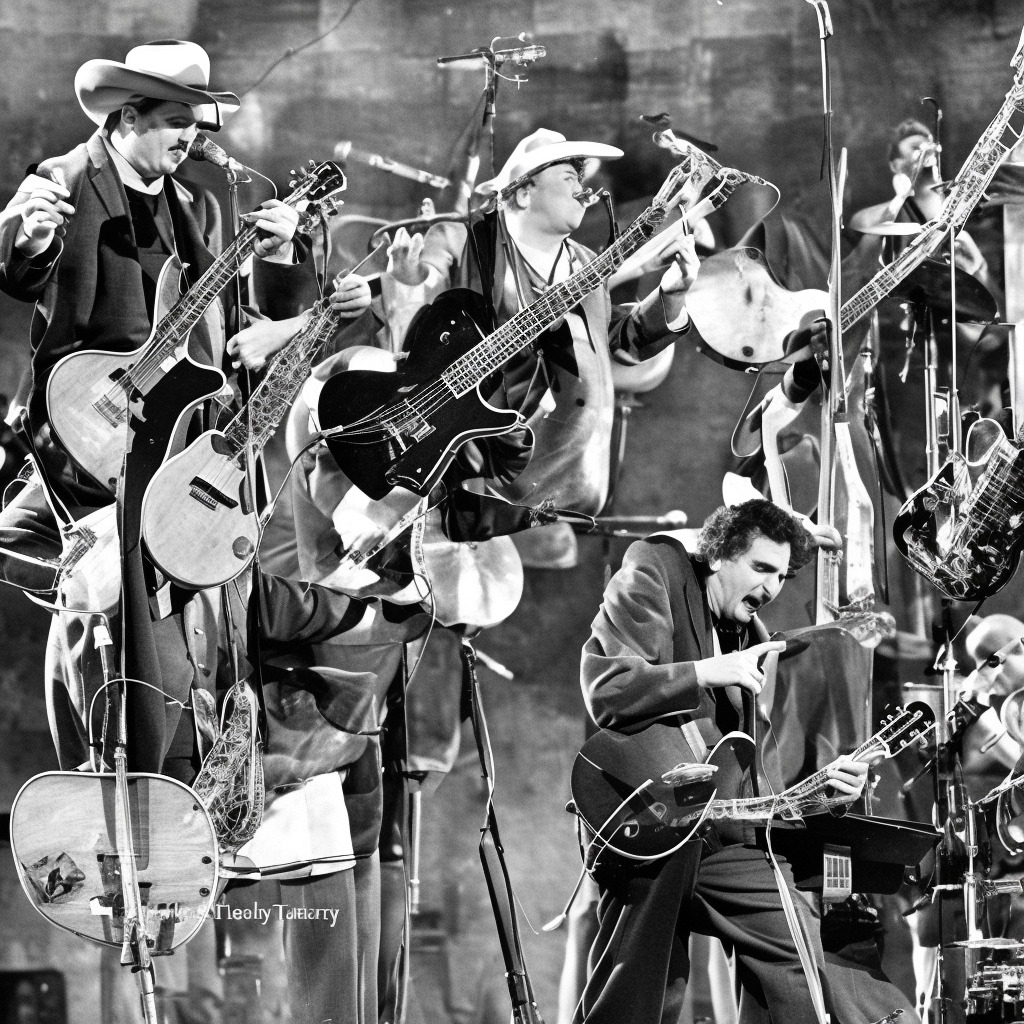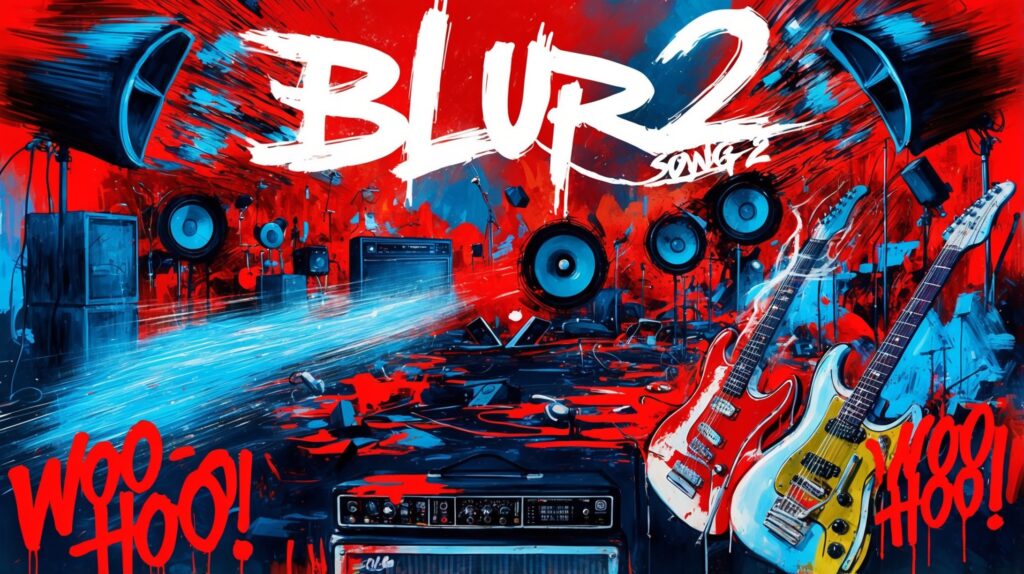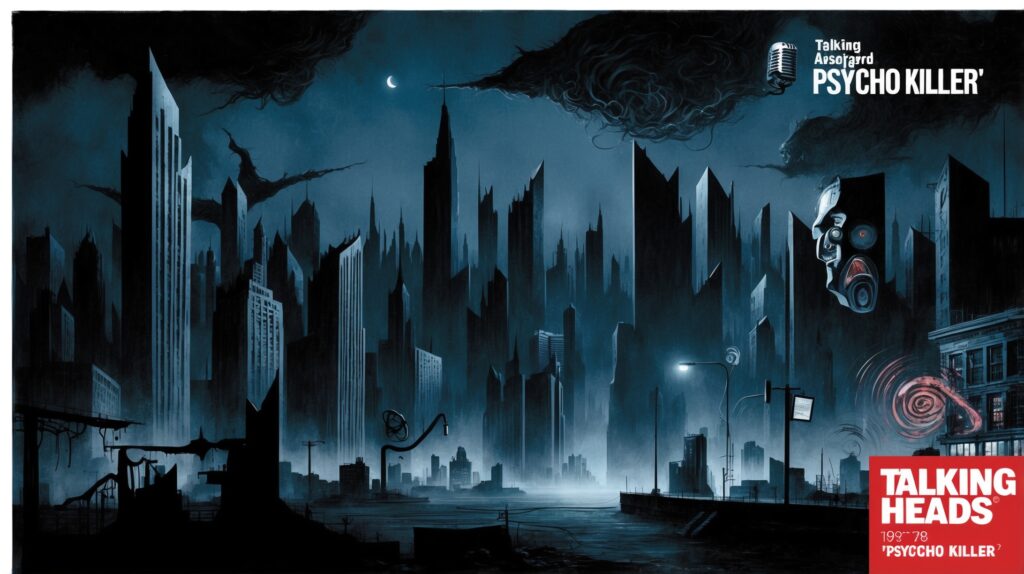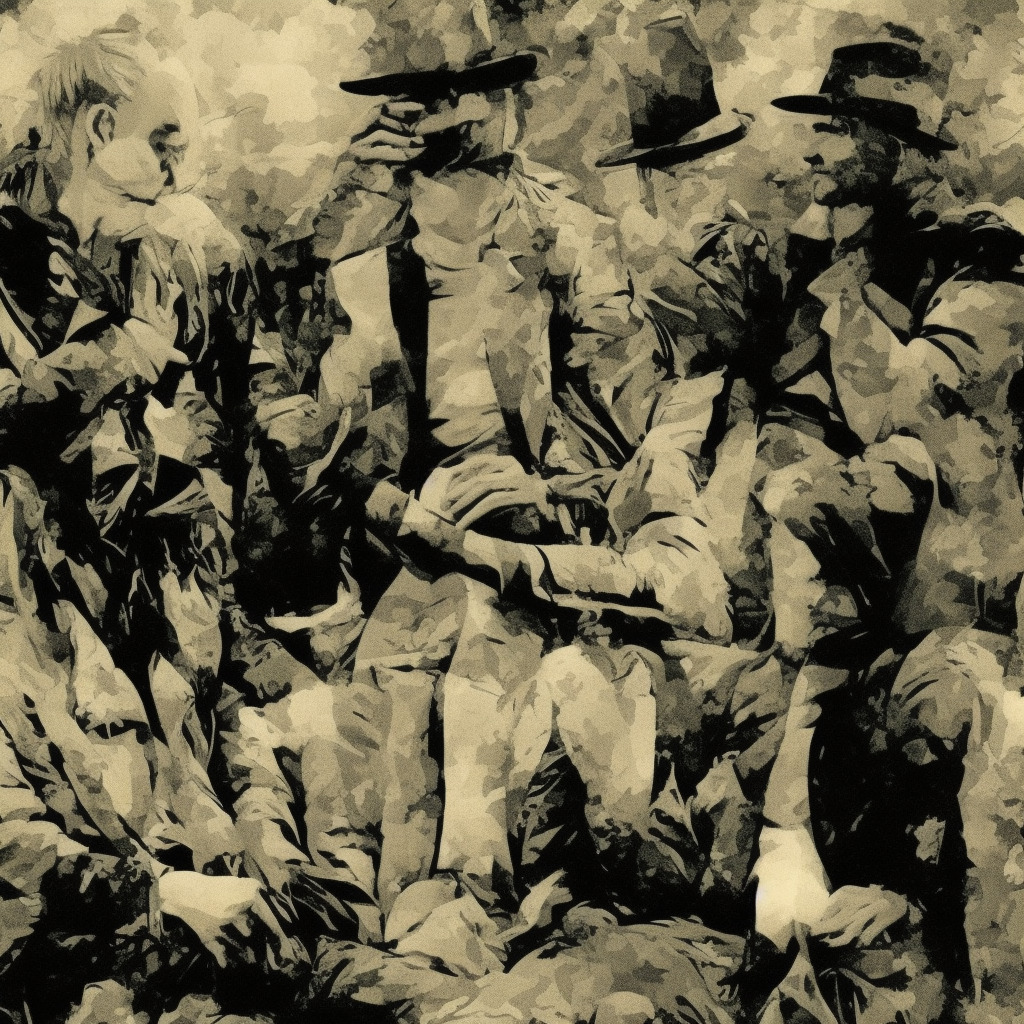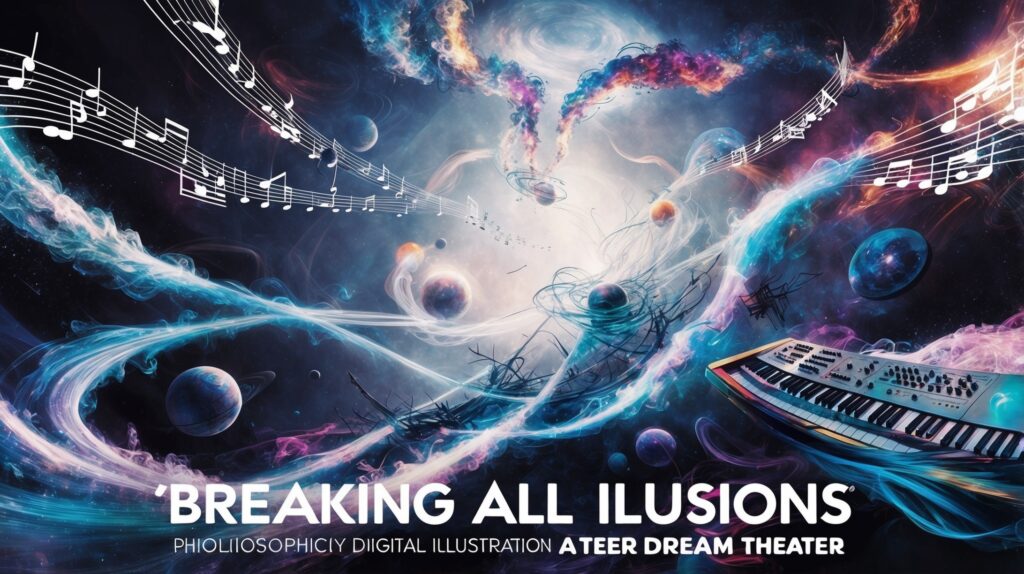🎶 Did you know? “The Hook” by Blues Traveler is a witty satire on formulaic pop songs! 🎤 John Popper’s harmonica skills are off the charts! 📈 Don’t miss this gem! 💎 #BluesTraveler #TheHook #HarmonicaHero #MusicTrivia 🎵 Read about it: tinyurl.com/4ejvhx37
Catching the Allure of Blues Traveler’s Timeless Classic
“Blues Traveler’s “The Hook” – a harmonica-driven critique on pop music, standing the test of time with its catchy melody and thought-provoking lyrics.”

For those unfamiliar with Blues Traveler, they are the ingenious American rock band hailing from Princeton, New Jersey, that formed back in 1987. The founding members, John Popper (lead vocals and harmonica), Chan Kinchla (guitar), Brendan Hill (drums), and the late Bobby Sheehan (bass), embarked on a musical journey that would soon elevate them to widespread fame.
Their talent and undeniable chemistry led to numerous accolades, including a Grammy Award for Best Rock Performance by a Duo or Group in 1995. This significant milestone was achieved thanks to their hit single “Run-Around,” showcasing Popper’s harmonica virtuosity, which eventually became the band’s signature sound.
But it was the 1994 single “The Hook” from their fourth album, “Four,” that truly demonstrated Blues Traveler’s lyrical prowess and musical ingenuity. The song, which ironically critiques the formulaic nature of pop music, became an instant hit and received significant radio play. It is a shining example of the band’s ability to blend rock, blues, and pop with clever, thought-provoking lyrics that challenge the status quo.
With its catchy melody and unforgettable harmonica riff, “The Hook” proved to be a fan favorite and has since become a staple of their live performances. The song displays Popper’s exceptional skills as both a vocalist and harmonica player, making it clear that he is a force to be reckoned with. Moreover, the dynamic interplay between Popper and Kinchla’s guitar work adds an extra layer of complexity to their oeuvre.
However, it’s worth noting that despite the band’s commercial success and critical acclaim, some detractors argue that Blues Traveler’s sound has stagnated over the years. Critics have pointed out that their formulaic approach to songwriting, albeit fitting for a song like “The Hook,” may hinder their ability to evolve as artists.
In spite of these critiques, Blues Traveler has maintained a loyal fan base and continued to produce albums that feature their unique blend of blues, rock, and pop. In 2021, almost three decades since they first broke onto the music scene, the band released their 14th studio album, “Traveler’s Blues,” which demonstrates their unwavering commitment to their craft and passion for making music.
In conclusion, Blues Traveler’s “The Hook” remains a powerful testament to the band’s talent and the captivating appeal of their music. As one of the standout songs in their extensive discography, it showcases the group’s versatility and ability to create meaningful compositions that resonate with listeners, even after all these years.
Charting the Journey of “The Hook”
“The Hook” catapults Blues Traveler to fame, cementing their legacy with its catchy melody, clever lyrics, and chart-topping success both nationally and internationally.

Following its release on August 27, 1994, “The Hook” quickly garnered attention and began its ascent on the charts. Featured on Blues Traveler’s fourth album, “Four,” the song’s catchy melody and clever lyrics made it an instant fan favorite.
Upon its debut, “The Hook” entered the Billboard Hot 100 chart at an impressive No. 64. As the tune gained traction on radio airwaves and MTV, it steadily climbed the chart, peaking at No. 23 on November 12, 1994. This marked a significant milestone for Blues Traveler, as it became their highest-charting single to date.
With its chart success, “The Hook” helped propel the album “Four” to reach triple-platinum status, selling over three million copies in the United States alone. It also earned the band a Grammy Award for Best Rock Performance by a Duo or Group with Vocal in 1996.
“The Hook” didn’t just make waves in the United States – it also found success on an international level. In Canada, the song peaked at No. 2 on the RPM Top Singles chart, while in Australia, it reached No. 27 on the ARIA Singles Chart.
Following the success of “The Hook,” Blues Traveler continued to produce chart-topping hits, such as “But Anyway” and “Run-Around.” While their subsequent releases may not have matched the chart success of “The Hook,” the band’s legacy remains cemented in music history, thanks in part to this iconic track.
Dissecting the Clever Wordplay of “The Hook”
It doesn’t matter what I say
So long as I sing with inflection
That makes you feel I’ll convey
Some inner truth or vast reflection
But I’ve said nothing so far
And I can keep it up for as long as it takes
And it don’t matter who you are
If I’m doing my job then it’s your resolve that breaks
Because the hook brings you back
I ain’t tellin’ you no lie
The hook brings you back
On that you can rely
The lyrics of “The Hook” by Blues Traveler are a testament to the band’s wit and self-awareness. At the time the song was released in 1994, the music industry was experiencing a resurgence of alternative rock and grunge, with bands like Nirvana, Pearl Jam, and Soundgarden dominating the airwaves. The overall atmosphere of the music scene at that time was one of rebellion and disillusionment, but Blues Traveler chose to approach the subject with a tongue-in-cheek attitude.
“The Hook” is essentially a critique of the way in which the music industry, and artists themselves, manipulate their audience. The lyrics play with the notion that a song’s content doesn’t matter as long as it has a catchy hook – something that listeners can easily latch onto and remember. This was, and arguably still is, a prevalent trend in popular music that many artists exploit for commercial success.
What makes “The Hook” stand out is its self-referential nature. The band essentially lays out a blueprint for crafting a hit song, noting the importance of singing with inflection to convey a sense of depth and emotional truth. The lyrics also highlight the fact that the song’s actual content is irrelevant, as long as the listener is captivated by the melody and delivery.
By candidly laying out the mechanics of writing a hit song, Blues Traveler cleverly comments on the commodification of music and the manipulative nature of the industry. In doing so, they offer a refreshing and thought-provoking perspective on the spirit of the time, and the way in which music reflects and shapes culture.
The Music Video: A Twist of Irony
“The Hook” music video: Blues Traveler’s satirical take on music industry clichés, showcasing authentic musicianship and fan creativity.
The music video for “The Hook” by Blues Traveler is a creative and ironic take on the very nature of the song itself. Directed by Frank W. Ockenfels III, a renowned photographer known for creating iconic imagery for various musicians, the video is a tongue-in-cheek commentary on the music industry and its fixation on commercial formulae.
The video features the band playing the song in a typical blues club setting, with John Popper, the lead singer and harmonica player, dressed as a businessman. Throughout the video, Popper can be seen highlighting various props that exemplify the clichés of a successful song – a top hat symbolizing wealth, sunglasses for the cool factor, and even a babe in his arms. The rest of the band members also join in on the fun, dressed in costumes ranging from a cowboy to a biker.
Ockenfels III takes a minimalist approach to the video’s production, choosing to keep the focus on the band members and their individual performances. This decision complements the song’s message about the superficiality of popular music and allows the viewer to appreciate the band’s musicianship and the song’s catchy melody.
Budget-wise, the video doesn’t appear to be a big-budget production, but that doesn’t detract from its charm. Instead, it adds to the authenticity of the band’s image and reflects their down-to-earth and genuine nature.
While “The Hook” does not have any official alternate music videos, fans have taken it upon themselves to create tributes and animated videos on YouTube. Some popular fan-made videos include an anime-style music video, a LEGO stop-motion animation, and even a compilation of various live performances of the song. These fan-generated videos further demonstrate the impact of Blues Traveler’s music on its audience and the creative ways fans engage with their favorite song.
In conclusion, the music video for “The Hook” by Blues Traveler is a prime example of how a music video can be both entertaining and thought-provoking, without relying on high production values or flashy visuals. The director, Frank W. Ockenfels III, successfully captures the essence of the song, highlighting the band’s unique talent while providing a humorous commentary on the music industry.
The Maestro Behind “The Hook”
John Popper, the mastermind composer and frontman of Blues Traveler, is the creative force behind their iconic hit “The Hook.” Born in Cleveland, Ohio, Popper has been a key contributor to the band’s success since its inception in the late ’80s. Besides his remarkable talent as a harmonica player and vocalist, Popper is known for his distinctive songwriting skills. In addition to “The Hook,” he has penned other noteworthy songs like “Run-Around” and “But Anyway,” which have also earned critical acclaim and commercial success. His dexterity in blending blues, rock, and folk elements continues to shape the band’s captivating sound and has solidified Blues Traveler’s position as a mainstay in the music scene for more than three decades.
Awards, Accolades, and Appearances
“Hooked on Nostalgia: Blues Traveler’s ’90s classic thrives through Grammy nods, movie soundtracks, and genre-crossing tributes.”
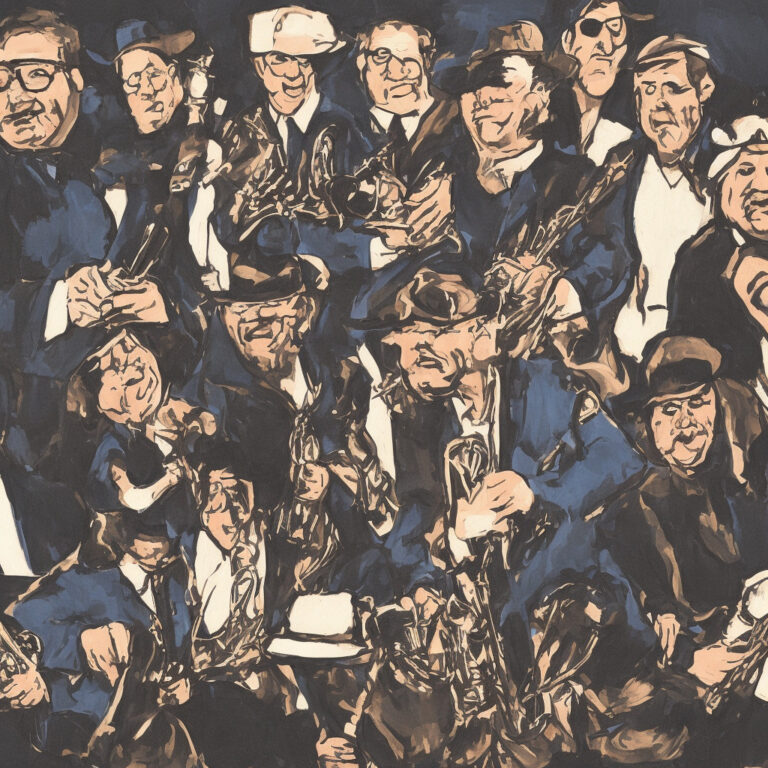
“The Hook” by Blues Traveler gained significant recognition and praise since its release in 1994. The song was nominated for a Grammy Award in 1995 for Best Rock Performance by a Duo or Group with Vocal, although it did not take home the coveted prize. Nonetheless, its infectious melody and clever lyrics resonated with audiences and cemented its place as a ’90s classic.
The song’s popularity led to its inclusion in various forms of media. It was featured in the 1997 comedy film “Father’s Day” starring Robin Williams and Billy Crystal, adding a touch of nostalgia and feel-good vibes to the movie’s soundtrack. Additionally, “The Hook” made its way into the realm of video games, appearing on the 2008 release of “Guitar Hero: On Tour” for the Nintendo DS, giving players the chance to jam out to the catchy tune.
Over the years, numerous musicians have paid tribute to “The Hook” by creating their unique renditions of the song. Notable artists who have covered the track include singer-songwriter David McMillin, who released an acoustic version in 2012, and the Canadian indie rock band Royal Canoe, who performed a live rendition in 2013. These covers showcase how the song continues to inspire and captivate musicians across different genres.
Even though “The Hook” did not win any major awards, it solidified Blues Traveler’s status as a prominent band in the ’90s music scene. Its presence in film and video games, as well as the various covers produced over time, demonstrate the song’s lasting impact and continued relevance in the music world.
Unraveling the Musical Intricacies
Diving into the musical structure of “The Hook,” we immediately notice its distinct key signature. The song is written in the key of D major, which is known for its rich and expressive sound. This choice of key is perfect for the song, as it allows the harmonica and guitar parts to truly shine and complement each other seamlessly.
One of the most striking features of the track is its chord progression, which follows a I-IV-V-IV pattern. This progression is a staple in the blues and rock genres, and Blues Traveler puts their own spin on it by incorporating the harmonica and using various rhythmic techniques. The chords used in the progression are D major (I), G major (IV), and A major (V). This progression remains consistent throughout the song, giving it a solid foundation that supports the dynamic melodic lines.
The tempo of “The Hook” is another key factor that contributes to its engaging sound. Clocking in at approximately 96 beats per minute (BPM), the song sits comfortably in a mid-tempo range that allows the listener to really absorb the intricate riffs and solos without feeling overwhelmed. This tempo choice also enables the band to experiment with syncopation and other rhythmic variations that add a layer of complexity to the piece.
Speaking of complexity, the song’s time signature is 4/4, which is quite common in pop and rock music. However, Blues Traveler manages to make it their own by playing with the rhythm and phrasing within this time signature. The drum patterns and bass lines weave in and out of the beat, creating an almost hypnotic groove that keeps the listener engaged throughout the entire song.
Another aspect worth noting is the use of dynamics and contrast within “The Hook.” The track seamlessly transitions from quieter verses to powerful choruses, showcasing the band’s ability to manipulate volume and intensity to their advantage. This not only adds emotional depth to the song, but also highlights the talent and versatility of Blues Traveler’s musicians.
Overall, the musical structure of “The Hook” is a perfect example of how Blues Traveler combines traditional blues-rock elements with their own unique flair. The song’s key, chord progression, tempo, and dynamics all come together to create a memorable and engaging listening experience that showcases the band’s remarkable talent and creativity.

